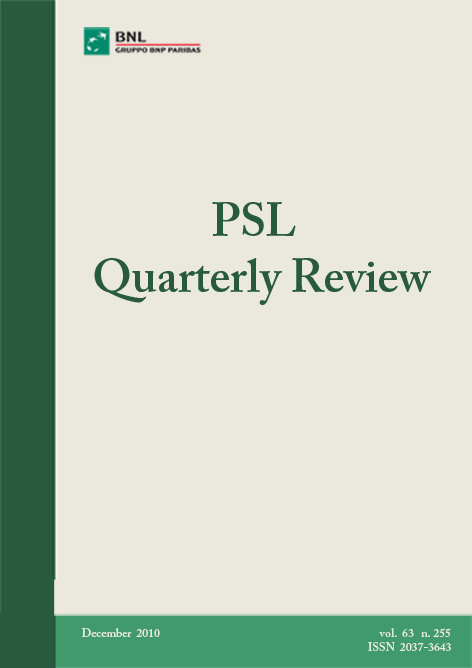Empowering supervisors with more principles and discretion to implement them will not reduce the dangers of the prudential approach to financial regulation
DOI:
https://doi.org/10.13133/2037-3643/9424Keywords:
financial regulatory framework, financial supervision, systemic riskAbstract
The paper addresses two main points: the deficiencies of the past regulatory design and the additional dangers coming from financial reforms that increase the regulatory powers of supervisors. The first point is briefly dealt with reference to past experience and alternative theoretical approaches. For the second point I argue that a prudential regulatory design necessarily leaves large discretionary powers to supervisors, who use them to shape the effective direction impressed to regulation. The current crisis has shown that the force of its first impact much depended on how supervisors had formerly utilised their discretion. Recent reforms and proposals are not changing the basic design of prudential regulation, while give additional regulatory powers to supervisors. If, as a consequence, we will experience in the short-run some regulatory uncertainty, lobbying pressures and international regulatory arbitrage will most probably guide the final result towards few additional regulatory costs and an unchanged systemic fragility. As an alternative we could go back to the methodology, not the specific design, of the Glass-Steagall Act, shaping the financial system by means of structural rules aided by few simple prudential ones.
JEL Codes: G18, G20, G28
References
BARTH J., CAPRIO G. JR., LEVINE R. (2004), "Bank regulation and supervision: what works best?", Journal of Financial Intermediation, vol. 13, pp. 205–248.
BASEL COMMITTEE ON BANKING SUPERVISION (1997), "Core principles for effective banking supervision", Basel, September.
BASEL COMMITTEE ON BANKING SUPERVISION (2006), "International convergence of capital measurement and capital standards", Basel, June.
BASEL COMMITTEE ON BANKING SUPERVISION (2006), "Core principles for effective banking supervision", Basel, October.
CORNFOLD A., KREGEL J. (1996), “Globalisation, capital flows and international regulation”, Working Paper, n. 161, Levy Economics Institute of Bard College, Annandale-on-Hudson (NY).
DAVIS POLK & WARDWELL (2010), Summary of the Dodd-Frank Wall Street Reform and Consumer Protection Act, Enacted into Law on July 21, 2010, July 21.
DODD-FRANK ACT (2010), Wall Street Reform and Consumer Protection Act, US Congress, H.R. 4173.
DRAGHI M. (2008), “How to Restore Financial Stability”, Bundesbank Lecture Series, September 16.
G20 (2009), “Enhancing Sound Regulation and Strengthening Transparency”, Working Group 1, Final Report, March 25.
G20 (2009), "Leaders' Statement: The Pittsburgh Summit", September 24–25.
GEITHNER T. (2009), "Written Testimony of the Secretary of the Treasury before the Joint Economic Committee, Financial Regulatory Reform", November 19.
HALDANE A. (2010), The $100 billion question, Bank of England, March.
KREGEL J. (2008), “Financial Flows and International Imbalances — The Role of Catching up by Late Industrializing Developing Countries”, Working Paper, n. 528, Levy Economics Institute of Bard College, Annandale-on-Hudson (NY).
KREGEL J. (2008), “Managing the impact of volatility in international capital markets in an uncertain world”, Draft Notes of Remarks prepared for the Conference Beyond Bretton Woods: The Transnational Economy in Search of New Institutions, Instituto de Investigaciones Económicas UNAM, 15-17 October.
KREGEL J. (2010), “Can a return to Glass-Steagall provide financial stability in the US financial system?”, PSL Quarterly Review, vol. 63 n. 252, pp. 39-76.
MACROECONOMIC ASSESSMENT GROUP (2010), “Interim report assessing the macroeconomic impact of the transition to stronger capital and liquidity requirements”, Bank for International Settlements, August.
MASCIANDARO D., QUINTYN M., TAYLOR M. (2008), "Inside and outside the central bank: independence and accountability in financial supervision. Trends and determinants", European Journal of Political Economy, vol. 24, pp. 833-848.
RONCAGLIA A. (2009), “Keynes and probability: an assessment”, European Journal of the History of Economic Thought, vol. 16, n. 3, pp. 489-510.
TOBIN J. (1984), “On the efficiency of the financial system”, Lloyds Bank Review, n. 153, pp. 1-15.
TONVERONACHI M. (2010), "Financial innovation and system design", PSL Quarterly Review, vol. 63 n. 253, pp. 131-144.
TONVERONACHI M., MONTANARO E. (2010), "Reestructuración del sistema financiero: presentación sintética de un enfoque alternativo para la regulación financiera", Ensayos Económicos, vol. 57, enero-marzo, Banco Central de la República Argentina.
TURNER A. (2009), “Responding to the financial crisis: challenging past assumptions”, Speech at the British Embassy, Paris, November 30.
Downloads
Published
How to Cite
Issue
Section
License



